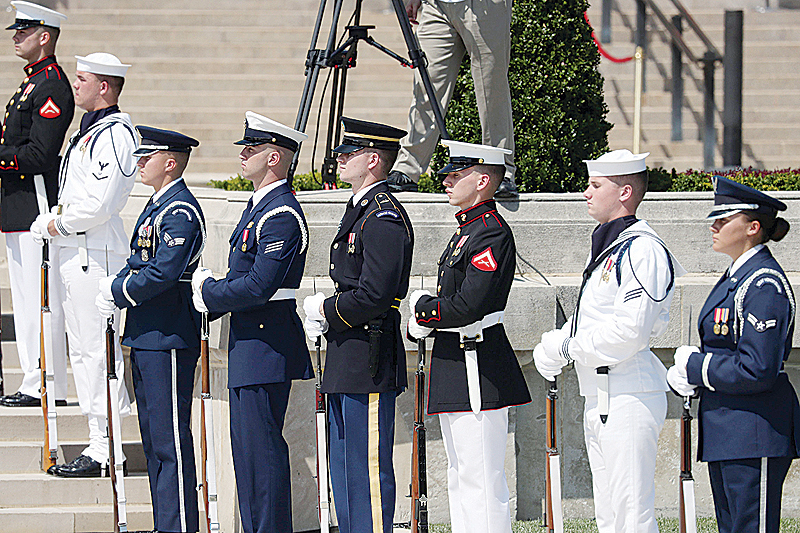Riyadh, allies thwart new Yemen rebel drone attack
WASHINGTON: President Donald Trump on Wednesday vetoed three congressional resolutions barring billions of dollars in weapons sales to countries including Saudi Arabia and the United Arab Emirates, which are engaged in a devastating war in Yemen. The resolutions "would weaken America's global competitiveness and damage the important relationships we share with our allies and partners," Trump said in letters to the Senate justifying blocking them.
It is the third time the president has employed his veto power since taking office. The measures cleared Congress this month in a strong rebuke to Trump, whose administration took the extraordinary step of bypassing legislators to approve the sales in May. Secretary of State Mike Pompeo had said the administration was responding to an emergency caused by Saudi Arabia's arch-foe Iran.
But lawmakers including some Senate Republicans said there were no legitimate grounds to circumvent Congress, which has the right to disapprove arms sales. Senator Lindsey Graham delivered a stinging rebuke to Riyadh last month, saying he hoped his vote against the sales would "send a signal to Saudi Arabia that if you act the way you're acting, there is no space for a strategic relationship."
The senator was referring to last year's brutal murder of journalist Jamal Khashoggi in Turkey at the hands of Saudi agents, an incident that outraged lawmakers and triggered a full-blown crisis in Riyadh's relations with the West. Critics also say the arms sales would aggravate the war in Yemen, where Saudi Arabia is leading a US-backed coalition that also includes the UAE in a battle against the Iranian-supported Houthi rebels.

Worst humanitarian crisis
The UN says the conflict has triggered the world's worst humanitarian crisis. But Trump argued Wednesday that barring the sale of US weapons "would likely prolong the conflict in Yemen and deepen the suffering it causes," and that "without precision-guided munitions, more-not fewer-civilians are likely to become casualties."
The US president also pointed to Iran in justifying blocking the resolutions. Saudi Arabia and the United Arab Emirates are "a bulwark against the malign activities of Iran and its proxies in the region," and the arms sale licenses Congress sought to block enhance their "ability to deter and defend against these threats," he argued. Tensions between Washington and Tehran have soared since Trump pulled the US out of a deal with Iran last year that was aimed at curbing its nuclear program, and imposed punishing sanctions.
The US has said it brought down one and possibly two Iranian drones last week, and has blamed Iran for a series of mysterious attacks on tanker ships in strategic Gulf waters. Tehran shot down an unmanned US aircraft in June, after which Trump announced that he had called off air strikes on Iran at the last minute because the resulting death toll would have been too high. Trump has said that the choice between war and diplomacy with Iran "could go either way," and that he is "okay either way it goes."
Rebel drone attack
In another development, Saudi air defenses intercepted a Yemeni rebel drone targeting a southwestern city yesterday, a Riyadh-led military coalition said, as cross-border attacks by the rebels showed no let-up. The rebels' top political leader, Mahdi Al-Mashat, had said on Tuesday that they were ready to stop attacks on Saudi Arabia and engage in dialogue provided it reciprocated and facilitated the flow of aid. "The drone targeting civilians in the city of Khamis Mushait has been intercepted and destroyed," coalition spokesman Turki al-Maliki told the official Saudi Press Agency.
Maliki denied claims made by the Huthi rebels on their Al-Masirah television that drones targeting the King Khaled airbase in Khamis Mushait had "achieved their goals precisely". "These are lies," he said, calling the attack "another act by the militias that is akin to a war crime". The Houthi rebels-who have faced persistent coalition bombing since March 2015 which has exacted a heavy civilian death toll-have stepped up missile and drone attacks across the border in recent weeks. Nine civilians were wounded in a July 3 Houthi attack on Abha airport in the south of the kingdom, the coalition said.
A June 12 missile attack on the same airport wounded 26 civilians, drawing warnings of "stern action" from the coalition. And on June 23, a rebel attack on Abha airport killed a Syrian and wounded 21 other civilians, the coalition said. The raids come amid heightened regional tensions as key Saudi ally the United States presses a "maximum pressure" campaign against its arch-rival Iran after withdrawing from a landmark 2015 nuclear deal between major powers and Tehran.
Saudi Arabia has repeatedly accused Iran of supplying sophisticated weapons to the Houthis, a charge Tehran denies. The coalition intervened in support of the Yemeni government in 2015 when President Abedrabbo Mansour Hadi fled into Saudi exile as the rebels closed in on his last remaining territory in and around second city Aden. Since then, the conflict has killed tens of thousands of people, many of them civilians, relief agencies say. The fighting has triggered what the United Nations describes as the world's worst humanitarian crisis, with millions displaced and in need of aid.- Agencies










